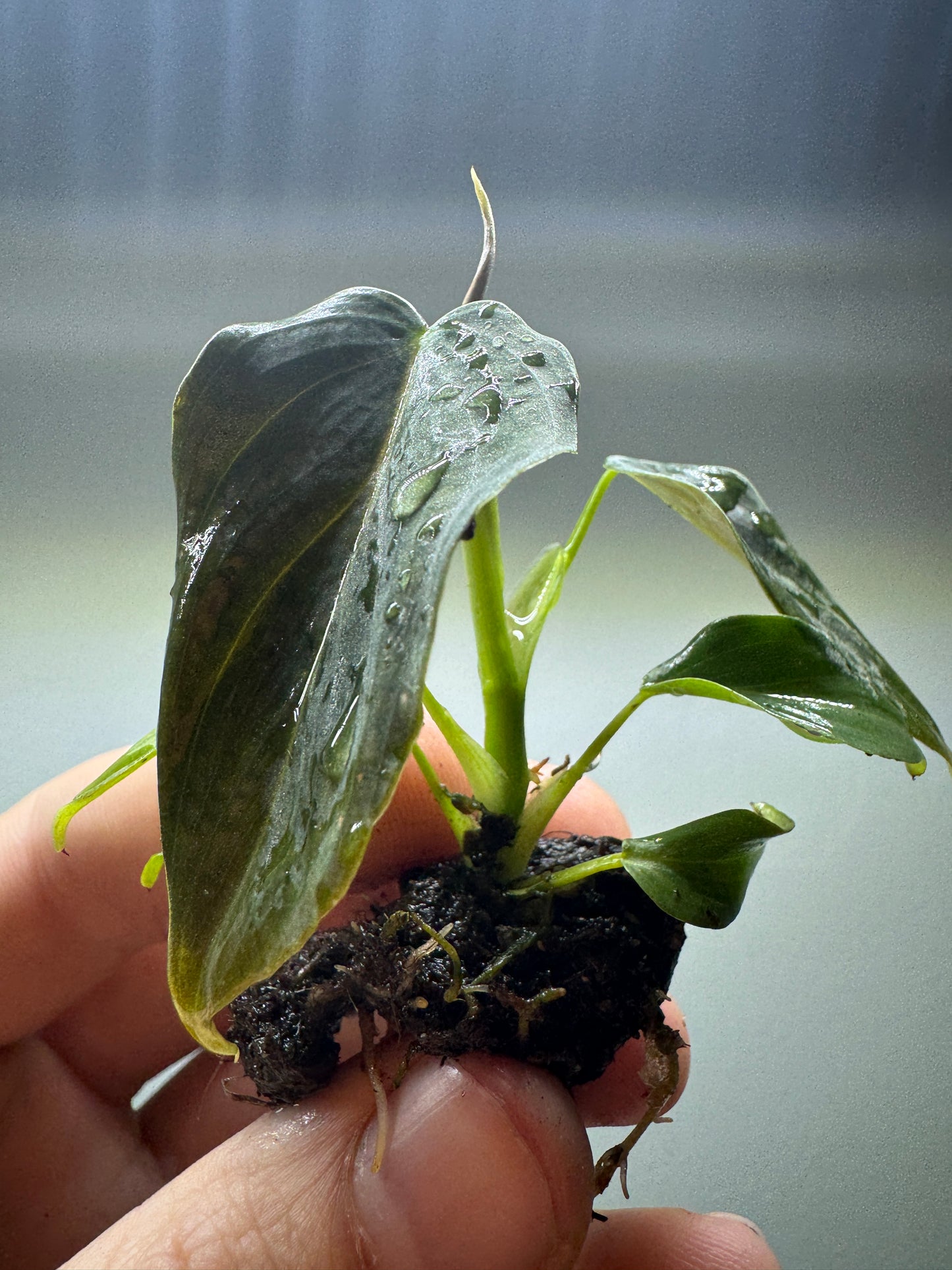Plantthatplant
Philodendron splendid
Philodendron splendid
Couldn't load pickup availability
Share
**Philodendron Splendid Care Tips**
Philodendron splendid is a hybrid plant, a cross between **Philodendron verrucosum** and **Philodendron melanochrysum**, known for its stunning velvety, heart-shaped leaves with striking veining. Here’s how to keep your Philodendron splendid healthy and thriving:
#### 1. **Light Requirements**
- **Bright, indirect light**: This plant thrives in bright, filtered light. Direct sunlight can scorch its leaves, while too little light may cause slow growth and less vibrant colors.
- **Avoid full shade**: While it can tolerate lower light, the plant's growth will be slower, and its leaves may not reach their full size.
#### 2. **Watering**
- **Keep soil evenly moist**: Philodendron splendid prefers consistently moist but well-draining soil. Water when the top 2-3 cm of soil feels dry.
- **Avoid overwatering**: Too much water can lead to root rot, so ensure that the pot has drainage holes and that the plant isn’t left sitting in water.
- **Increase humidity**: These plants love humidity. Misting or using a humidity tray can help maintain an ideal environment, especially in drier climates or during winter.
#### 3. **Temperature & Humidity**
- **Warm temperatures**: Ideal temperature range is between 18-27°C (65-80°F). Keep it away from cold drafts or air conditioning vents.
- **High humidity**: As a tropical plant, Philodendron splendid thrives in humidity levels above 60%. If possible, place it in a humid environment like a bathroom or use a humidifier.
#### 4. **Soil Requirements**
- **Well-draining, airy soil**: Use a mix that retains moisture but also drains well. A mix of peat, perlite, orchid bark, and aroid mix works well.
- **pH level**: Slightly acidic to neutral soil (6.0-7.0 pH) is ideal for this plant.
#### 5. **Fertilizing**
- **Feed during the growing season**: Use a balanced, water-soluble fertilizer once a month during spring and summer. Reduce feeding during fall and winter when the plant’s growth slows.
- **Avoid over-fertilization**: Too much fertilizer can lead to salt build-up in the soil, which can harm the roots.
#### 6. **Pruning & Maintenance**
- **Regular pruning**: Trim any yellow or damaged leaves to encourage healthy new growth. Philodendron splendid can grow leggy, so prune it back to promote a fuller shape.
- **Support for climbing**: This plant is a climber, so offering a moss pole or trellis will help it grow upright and develop larger, healthier leaves.
#### 7. **Propagation**
- **Stem cuttings**: Philodendron splendid can be propagated via stem cuttings in water or directly in soil. Ensure the cutting has at least one node (the point where leaves and roots grow).
---
### **Background History of Philodendron Splendid**
Philodendron splendid is a hybrid cross between two species in the **Araceae** family: **Philodendron verrucosum** and **Philodendron melanochrysum**. Both parent plants are prized by collectors for their striking leaves and distinct growth patterns, and the hybrid combines some of the best traits of both.
- **Philodendron verrucosum** originates from the tropical rainforests of Central and South America. It is known for its vibrant green leaves with dramatic veins and a fuzzy texture on the petioles.
- **Philodendron melanochrysum** hails from Colombia and Ecuador, famous for its dark, velvety leaves with golden veins. This species has long, elongated leaves that grow larger over time, often developing a heart shape.
The **Philodendron splendid** was likely bred with the goal of combining the velvety leaves and intricate veining of **P. melanochrysum** with the vigorous growth and texture of **P. verrucosum**. The result is a plant with lush, velvety leaves, often heart-shaped, with pronounced veining. It is highly coveted by plant enthusiasts and often regarded as a more resilient alternative to its delicate parent species.
This hybrid is an excellent choice for indoor collectors due to its aesthetic appeal and relative ease of care compared to its more finicky parent species.


